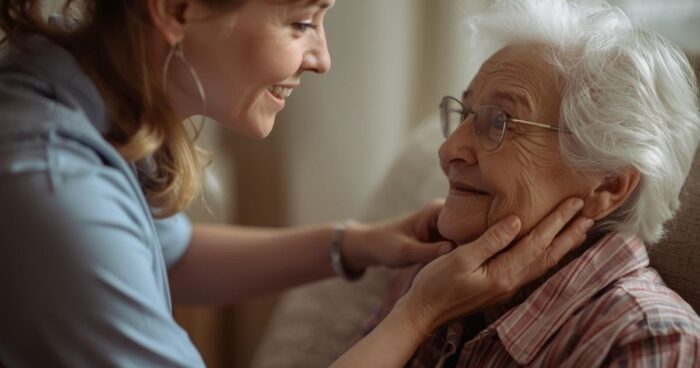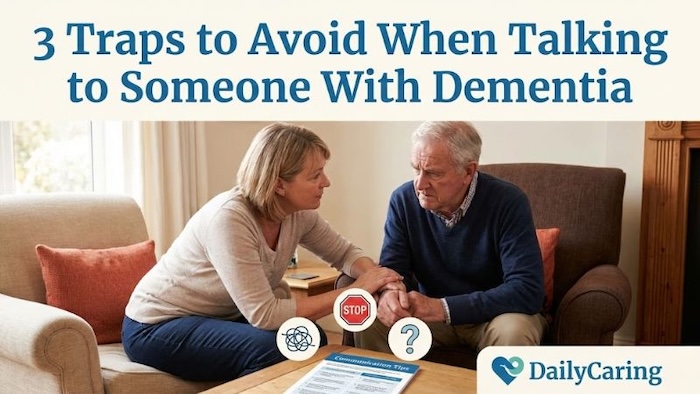The irony is that you may be unintentionally causing their negative reactions. Your loved one might not be ungrateful; they could be reacting instinctively to the situation.
You mean well, but you may not be aware of how your actions are coming across. Getting a better understanding of what’s happening will improve communication and increase cooperation.

We're highlighting video from expert dementia educator Teepa Snow. She acts out three scenarios to show why seniors with dementia might react defensively when you’re trying to help and how a different approach is more successful.
She also explains what causes irrational behavior in dementia.
Your Actions Could Be Causing Seniors With Dementia to Resist Your Help
Teepa Snow Discusses the Rules of Dementia Care
We’ve included explanations of each scenario, but we highly encourage you to watch the video. Teepa’s teaching style brings each example to life.
Watching the entire video is a great way to learn more about dementia’s effect on the brain. Teepa has a refreshing, straightforward way of explaining the science, making it easy to understand and apply to real life.
1. Conflict happens when visual cues don’t match the spoken explanation
In this scenario, Teepa shows how you could unintentionally mislead your loved one, causing them to get startled and become defensive or combative.
When someone has dementia, they tend to pay more attention to what they see than to what they hear. As humans, our instinct is to get information from what we see. Visual information becomes even more dominant as changes in the brain make it more difficult to understand speech.
That’s why it’s necessary to reduce the amount of talking and use clear visual cues when you’re helping someone with dementia. This increases your loved one's understanding of what’s happening and helps them cooperate better.
Teepa starts speaking to a woman in the audience using garbled words. This is an example of how someone with dementia could have a hard time comprehending speech even if they can hear perfectly well.
Along with her words, Teepa uses body language and visual cues to get the woman to stand up and follow her. But when Teepa moves to take off the woman’s pants, the woman instinctively grabs at her clothes to stop Teepa.
Teepa’s friendly smiles and nods didn’t convey her intended actions, leading to a startled flight-or-fight response. The last thing the woman expected was for someone to try to remove her clothing. It surprised her, and she reacted defensively out of instinct.
That makes it seem like the woman is being uncooperative or refusing help. In truth, she’s protecting herself from what appears to be a sudden invasion of privacy.
Any of us would have reacted similarly. In fact, you were probably surprised to see Teepa reaching for the woman’s pants. It isn’t clear to us what’s going on until Teepa explains that what she really said was “I’m going to give you a shower, OK? Let me take your pants off.”
2. Communicating with clear visual cues and few words is more successful
Next, Teepa shows us how to get someone ready for bathing without the misunderstanding that happened before. Taking a different approach, she gets the woman to start taking off her own clothes without a fuss
As she directs the woman to take off her shirt, Teepa talks very little. Instead, she uses clear visual cues by first demonstrating on herself by pretending to unbutton her shirt. Then she points to the woman’s shirt to get her to copy the same actions. She uses smiles and positive words to reinforce the behavior she wants to see.
This way, the undressing process has already begun, and it won’t be as shocking to your loved one if you gently start helping them as they struggle with their buttons.
3. Helping can sometimes feel invasive
In another example, Teepa attempts to help the woman, but her movements cause the volunteer to instinctively avoid Teepa’s touch and push her hands away.
It looks like the woman is being difficult, but she’s actually feeling uncomfortable and reacting instinctively to make it stop.
Being aware of how your loved one might perceive your actions helps you approach them in ways that will make them feel comfortable so you can get the job done.
4. How changes in the brain affect behavior
In this section, Teepa explains why people with dementia behave in irrational or impulsive ways. In the brain scans, she points out the physical changes happening in the brain – in the limbic system, amygdala, and neocortex.
Basically, the parts of the brain that drive impulses and wants get pumped up. At the same time, the part that reins us in and helps us control our actions is shrinking. That’s what leads to the “I want what I want when I want it” behavior. It seems irrational and uncontrolled because the brain is struggling to control its impulses.
The Bottom Line
Knowing what’s happening and how to approach it better doesn’t always make dementia-related behavior challenges disappear or eliminate your frustration.
But it does help to not be entirely in the dark about why your loved one is behaving in these strange ways. It also helps to know that they’re not doing it on purpose and it’s not intended to cause you trouble or annoy you.
Recommended for you:
- How to Help Someone with Alzheimer's: 5 Essential Tips from Expert Teepa Snow [Video]
- How to Talk to Someone with Alzheimer’s: Use Short, Direct Sentences
- 3 Ways to Respond When Someone with Alzheimer’s Says I Want to Go Home
About the Author

Connie is the founder of DailyCaring.com and was a hands-on caregiver for her grandmother for 20 years. (Grandma made it to 101 years old!) She knows how challenging, overwhelming, and all-consuming caring for an older adult can be. She also understands the importance of support, especially in the form of practical solutions, valuable resources, and self-care tips.














The video about refusal to bathing is no longer available.
Could you please provide any website that I can watch the video?
I would like to learn more about the techniques of helping people with dementia to shower in residential home.
Thanks
We’ve got another article about helping someone with dementia to bathe that might be more helpful – 7 Tips to Get Someone with Dementia to Shower https://dailycaring.com/7-tips-to-get-someone-with-alzheimers-to-take-a-bath/